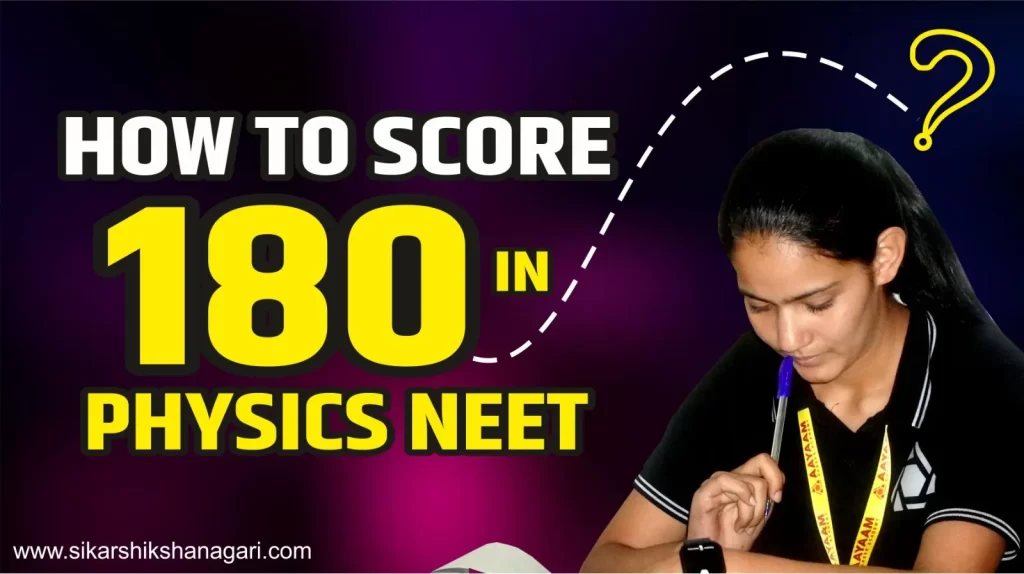While a strong Physics score is key to a high rank in NEET, the subject’s difficulty can be daunting hence we will know how to score 180 in Physics NEET . Luckily, there are strategies to conquer NEET Physics, such as building a solid understanding of concepts and using effective study materials. Suresh Mandia (Director- Avyaam Career Academy)
Table of Contents
Physics is the nemesis of many NEET hopefuls. While a strong score can boost your rank, the subject’s complexity often trips up students. Thankfully, with the right approach, you can overcome this challenge and conquer NEET Physics.

Deceptively Simple, Surprisingly Tough: Physics in NEET. NEET physics might seem clear-cut compared to Chemistry, with a well-defined syllabus. However, this straightforwardness can be misleading. Despite its apparent structure, Physics continues to be a significant hurdle for many NEET aspirants. How to score 180 in Physics NEET
As per survey by Sikar Shiksha Nagari, Avyaam is best coaching for NEET in Sikar.
The Physics Pitfall: Studying It Like Biology and Chemistry. Physics stands out in NEET because it requires a fundamentally different approach compared to Biology and Chemistry. Many students fall into the trap of studying Physics the same way they study these other subjects, leading to frustration.How to score 180 in Physics NEET
Understanding the Difference in Physics
Physics: Unveiling the Secrets of Our World. How to score 180 in Physics NEET
Physics isn’t just a subject – it’s a key that unlocks the mysteries of the world around us. As you delve into physics, you’ll discover the hidden forces and principles that govern everything from the tiniest atom to the vast expanse of space.
Physics: Beyond the Formula Sheet. How to score 180 in Physics NEET
Cracking Physics isn’t just about stockpiling formulas and plugging them into questions. True understanding comes from grasping the underlying concepts that make those formulas work. This deeper knowledge empowers you to solve problems you’ve never encountered before.
Physics vs. Biology: The Time vs. Revision Trade-Off. How to score 180 in Physics NEET
While a single Physics chapter might require more upfront study time to grasp the concepts, the payoff comes in the form of fewer revisions needed later. Conversely, Biology chapters may be quicker to get through initially, but the memorization-heavy content often requires more frequent revisiting.
What Students generally do in Physics: How to score 180 in Physics NEET
Below are the steps students generally follow in understanding physics
- 1. Active Listening : You attend lectures attentively, but there are gaps in understanding.
- 2. Rote memorization: You study notes at home, focusing on memorizing formulas and solving assigned homework questions.
- 3. Limited Practice: You continue this pattern until the chapter ends in class.
- 4. Reactive Clarification: Once the chapter is complete, you solve questions from exercises and then seek clarification for any doubts encountered.
- 5. Repetition with Limited Variation: During revision, you primarily rely on notes and questions within them, or solely focus on exercise problems, potentially missing a broader perspective.
The Common Physics Grind: How to score 180 in Physics NEET
This cycle of attending lectures, memorizing formulas from notes, and practicing assigned homework problems is a familiar routine for many physics students. Some even push themselves further by tackling additional questions from practice exams and external resources.
The 140-150 Ceiling: How to score 180 in Physics NEET
While the current study method might get you to a score range of 120-140, it often plateaus around 140-150. This suggests there’s a gap between this approach and achieving a truly exceptional score.
The Frustrating Plateau: How to score 180 in Physics NEET
Many students diligently follow the routine of attending lectures, memorizing formulas, and practicing problems. However, this approach often leads to a frustrating score ceiling around 140-150. The key question often remains unasked: “Is there a more effective way to learn?” Unfortunately, the focus then shifts solely to rote memorization and question repetition, which ultimately hinders the chance of breaking through this barrier.
Learning Phases/Curve in Physics
The Information Gap: How to score 180 in Physics NEET
Your current study approach might be limiting your score improvement. Relying solely on notes and question practice restricts the information your brain has to work with. To truly excel in Physics, you need to provide your brain with a richer variety of resources or enough information that helps you connect and understand different concepts. This will empower you to make deeper connections and solve problems more effectively. It might be possible that only notes and solving questions in modules are not enough information to understand concepts of physics.
The Missing Piece: Finding and Using Extra Information. How to score 180 in Physics NEET
The key to breaking past the score barrier lies in supplementing your studies with a wider range of information. However, many students struggle with two hurdles:
- Identifying Resources: They might not be aware of the wealth of effective learning materials available beyond notes and practice problems.
- Effective Utilization: Even if they find these resources, they might be unsure how to integrate them efficiently into their study routine.
Three Phases of Learning Phases
Phase 1. As previously mentioned, the basic routine everyone follows includes attending lectures (whether online or in person), reviewing class notes thoroughly, and practicing problem-solving. These foundational steps are essential. If you neglect these and expect your grades to improve magically, I regret to inform you that you’re not approaching your studies seriously, and consequently, your grades will not improve. Therefore, ensure you attend lectures attentively, revise your notes diligently, and actively engage in solving exercise questions. How to score 180 in Physics NEET
Phase 2. To expand your theoretical knowledge, I recommend starting with Aayaam modules for their concise theoretical content, available for free as PDFs online. They provide a structured approach to familiarize yourself with theoretical concepts effectively. You can substitute Aayaam modules with any other coaching modules as well. There are various reference books available in the market for NEET and with varying difficulty level so a student can choose the book as well depending on his comfort and preference.
Phase 3. Upon successfully completing the first two phases, you’ll likely achieve an average score of around 150-160 in physics. Phase 3 is where you consolidate your understanding. Begin by thoroughly studying NCERT, focusing on comprehending every line without resorting to mere memorization. By following NCERT closely, you’ll deepen your understanding of physics. You’ll encounter familiar formulas used in solving problems, but now you’ll grasp their derivations and gain insights into theoretical points that may not have been emphasized in class. This phase enables a complete understanding of physics, allowing you to visualize various scenarios vividly. It’s an exhilarating experience!
Only after completing all three phases of learning can you confidently say you’ve mastered a chapter. This comprehensive approach not only enhances your understanding but also significantly improves your academic performance.
Extra Tips:
Enhance your visualization skills: When solving problems, create mental images to aid your understanding.
Allow time for understanding: Don’t expect to grasp everything from a chapter in a single day. Your brain needs time to process information, so allocate sufficient time for each concept to sink in.
Implement spaced repetition: If time is limited, use spaced repetition. After studying a chapter, the next day, start a new chapter but also revise the one you studied previously. Continue this pattern, gradually increasing the number of chapters you revise each day. This method ensures thorough retention over time.
These methods will make sure that a student scores 180 out of 180 in Physics in NEET.


